TIZ 3. Political Matter
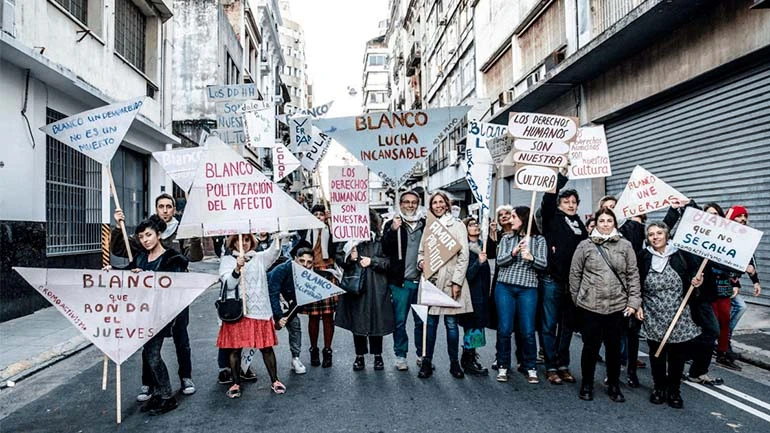
Held on 11 May 2022
Appealing to political matter involves naming coincidences between likeminded curatorial proposals — made visible over these months in the Museo — the manufacturing of which encompasses at once subject matter and care, form and delicacy, craftsmanship and communal living. These acts affect ostensibly old media, upholding an artisan understanding of technology, opening out towards a general public, delaying times and processes. Thus, the understanding of wood and linoleum used in etchings modulates a resistance to the rise of historical fascism, according to Benjamin H.D. Buchloh, in much the same way as the connection of presents and pasts in Latin American history via expanded forms in precarious and ephemeral supports running through struggles and movements, bodies and desires, in accordance with the research of the Southern Conceptualisms Network. It means to understand art-making as ways of loving, materialising in works which are genuinely mixed, and attempts to operate in the gaps, the spaces, the limits of what is and is not word, voice, body or human, in tune with Alejandra Riera’s exhibition proposal. Political matter requires a non-dissociation of art and politics with regard to artisan work, and modes of occupying time and the relationship it articulates.
Therefore, these learnings are the result of an expanded concept of graphic art — in relation to matter that wants to be political, form that wants to be time, work that wants to be care — and are connected via this third Temporary Intensity Zone (TIZ), discerning that which is minor, which falls under the radars of social life, requiring its own procedures for access. These are tools which put forward a sociology of ordinary culture, the intensities of which formalise the film-making of Gonzalo García-Pelayo, for instance, or the profusion of “graphic bursts” linked to the contemporary demands of movements and neighbourhoods, also linked to the matter of those voices with which their memories are entwined, and always placing the stress on the sensitive and the specific, as well as other undertakings included in this programme.
-
Wednesday, 11 May 2022 Nouvel Building, Protocol Room and online platform
Situated Voices 23
How Can We Make Room for Neighbourhood Memories?
TicketsNeighbourhood memories belong to the inhabitants — their situated experiences, relationships, celebrations, conflicts and traumas — the spaces they occupy, mutual support networks and struggles to improve both their lives and their environment. In this edition of Situated Voices dialogue takes place around the different experiences and strategies to build collective memory, from the certainty that producing and caring for neighbourhood memories is essential for improving the living conditions of people that inhabit them.
Coordinated by: the Postory research group – Autonomous University of Madrid (UAM)
Organized by: GRIGRI, Museo Situado and the Postory research group - Autonomous University of Madrid (UAM)
Collaboration: Autonomous University of Madrid (UAM)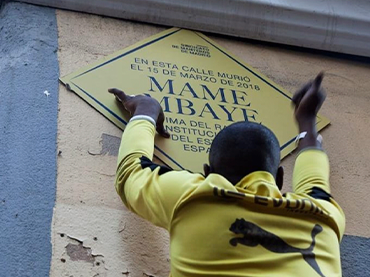
-
Wednesday, 18, and Thursday, 19 May 2022 Sabatini Building, Auditorium and online platform
Graphic Action Art, Revolt and Anti-Fascism
International Encounter on Graphic Turn
TicketsThis international encounter, setting out from Graphic Turn. Like the Ivy on a Wall, a collective exhibition stemming from a long research process driven by the Southern Conceptualisms Network, brings together researchers, artists and activists as it looks to foster exchanges to examine art and political graphic action art in Latin America, as much in its recent history as a present characterised by the return of authoritarianism and the loss of civil liberties. The programme comprises tables to debate themes and presents the performance Neither True Nor False, which Argentinian activist and artist Mariela Scafati has been developing since 2013 as an exercise of memory that revisits the last twenty years of her committed practice in serigraphic activism.
Organised by: Museo Reina Sofía and the Southern Conceptualisms Network
Collaboration: Mexican Embassy in Spain, Cultural Diplomacy of Mexico, Cultural Institute of Mexico in Spain and hablarenarte
With the support of: Chile’s National Agency of Research and Development (Proyecto Fondecyt/ANID nº 11201004)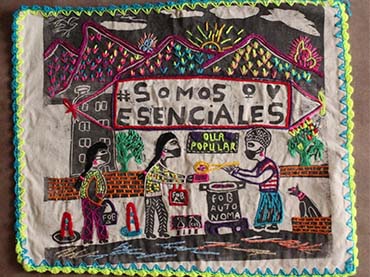
-
Friday, 20 May 2022 Sabatini Building, Floor 3
Polyphonic Tour Around Graphic Turn
RegistrationThis guided tour around the exhibition Graphic Turn. Like the Ivy on a Wall is set forth as a polyphonic exercise. The tour commences with approaches that run through the research, before focusing on and discussing certain concepts that form the backbone of its narratives — the graphic turn, graphic bodies, untimely graphic art, (secret) border-crossings, delay and the persistence of memory, among others — and certain pivotal cases, such as the disappearance of forty-three students in Ayotzinapa, Mexico.
Organised by: Museo Reina Sofía
Collaboration: illycaffè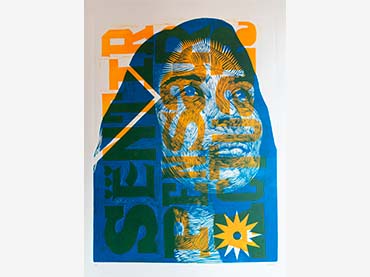
-
Friday, 20 May 2022 Esta es una plaza (Street Doctor Fourquet 24, Madrid)
Graphic Outbreak 5. The Poetic Activism of Colour
Workshop with Cromoactivismo
This workshop aims to collectively produce hand-painted cardboard posters which serve as tools to grant visibility for social campaigns. On this occasion, work is carried out specifically with the campaign #ESenciales* #RegularizacionYa (#ESsential* #RegularisationNow), which fights to obtain the extraordinary regularisation of 500,000 people in an irregular administrative situation and who cannot exercise their rights in the Spanish State.
Coordinated by: Guillermina Mongan
Organised by: Museo Situado and the Southern Conceptualisms Network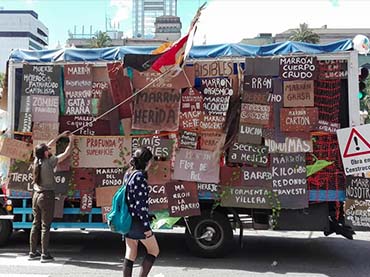
-
Saturday, 21 May 2022 Espacio de Encuentro Feminista (Street Ribera de Curtidores 2, Madrid)
Graphic Outbreak 6. O Corpo como Poética da Luta
Workshop with Coletivo Alvorada
This activity focuses on the body, flash mobs and textiles as strategies to burst into public space. The initiative is carried out in dialogue with the demonstrations of domestic and care workers to pass Agreement 189 of the International Work Organisation (OIT), which looks to level up the work situation of domestic workers in Spain with other workers.
Coordinated by: Guillermina Mongan
Organised by: Museo Situado and the Southern Conceptualisms Network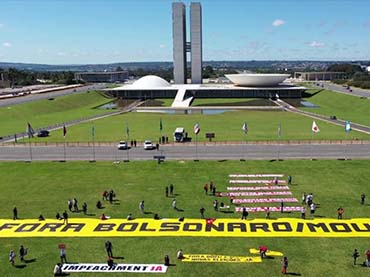
-
Sunday, 22 May 2022 Mbolo Moy Dole (Street Dos Hermanas 14, Madrid)
Graphic Outbreak 7. Light and Recording for Resistance
Workshop with Delight Lab and Vórtice Creativo CIMA
This workshop seeks to create a space of reflection to collectively build slogans that can be projected in public space using the video mapping technique and which help to stress social problems such as health exclusion in the Spanish State. Following the passing of Royal Decree-Law 16/2012, of 20 April, access to the National Health System (SNS) in Spain is linked to people’s administrative situation, making it increasingly less accessible and universal.
Coordinated by: Guillermina Mongan
Organised by: Museo Situado and the Southern Conceptualisms Network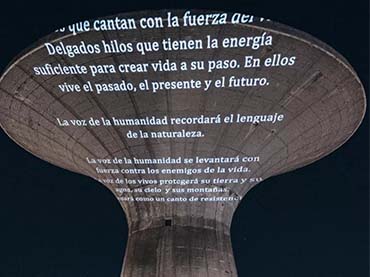
-
23 May - 25 June 2022
Stop Prohibiting Because I Can’t Disobey Everything
The Films of Gonzalo García-Pelayo
A film retrospective which explores the work of Gonzalo García-Pelayo (Madrid, 1947) and underground culture in transition-to-democracy Spain, focusing on the historical feature-length films he made from 1975 to 1986. The series dispenses with a traditional historicist and revisionist orientation to situate the film-maker in a contemporary dialogue, in thematic sessions, with young artists and producers, his major themes reverberating among them: sex as a free territory, misfits and the socially marginalised as lucid and honest anti-heroes, the radical co-existence between the exalted and the popular and music — flamenco, psychodelia, sevillanas — as an eruption of the real in fiction.
Organised by: Museo Reina Sofía and Documenta Madrid (19th International Film Festival)
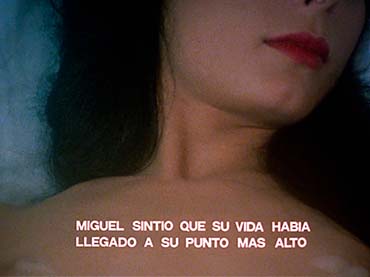
-
Saturday, 28, and Sunday, 29 May 2022 Nouvel Building, Auditorium 200
Ordinary Times
Sociología Ordinaria Encounter #10
Sociología Ordinaria (Ordinary Sociology) is a transdisciplinary research group which sets out to explore daily knowledge considered ordinary, superficial or frivolous by traditional academic and intellectual views. Therefore, over the past decade the group’s members have sought to render an account of the complexity and power relations underlying diverse social and cultural phenomena such as the use of dating apps, language around COVID-19, the world of the cuplé, reality shows, pyjama parties, pop stars, TikTokers, club culture, and so on. In this tenth edition of the Sociología Ordinaria Encounters, an open, multidisciplinary space is facilitated to learn from daily culture.
Organised by: Museo Reina Sofía and the Sociología Ordinaria research group – Complutense University of Madrid (UCM)
-
Episode 1. Avant-garde Territories: City, Architecture and Magazines Sabatini Building, Floor 2
Carl Einstein. The Masses Are the Artist. Room 206.03
Carl Einstein was an avant-garde poet and writer, theorist and art critic. His political commitment shaped his life and work, in an understanding of art as a process that transforms human beings and reality. Through this vision, his life was traversed by concerns centring on politically and formally committed artistic processes, with this room displaying examples of the artists Einstein wrote about, for instance Picasso, Miró and Dalí, in addition to the different African masks he collected (from the Yoruba, Senufo, Baule and Punu peoples).
-
Episode 1. Avant-garde Territories: City, Architecture and Magazines Sabatini Building, Floor 2
The International Exposition of 1937: Architecture, Art and Propaganda. Rooms 205.08 and 205.09
The Spanish Pavilion at the Exposition Internationale des Arts et Techniques dans la Vie Moderne, held in Paris in 1937, was conceived as a propaganda device to defend the Spanish Republic’s advances and demonstrate and denounce the dire situation the Spanish people faced in the Civil War. The Pavilion’s different spaces were enlivened by film screenings, concerts, dance recitals and theatre performances, along with a display of photographs, ceramics and textiles, anchoring the idea that the political situation at the time must not overshadow the long history of popular tradition.
-
Episode 2. The Lost Thought Sabatini Building, Floor 4
Renau in Mexico. Room 403
Artistic production and political activity are indistinguishable in the figure of Josep Renau. Throughout his exiles, Renau worked on murals, prints and editorial work, for instance those he contributed to the magazine Futuro, posters made within the sphere of the Taller de Gráfica Popular and, finally, different works for film and television, using animation to transmit information. In this room, a number of posters made for different Mexican campaigns, and from exile between 1939 and the 1950s, are displayed, alongside a major representation of copies of the magazine Futuro, paradigms of the artist’s use of photomontage.
-
Episode 2. The Lost Thought Sabatini Building, Floor 4
Anti-fascism and Graphic Art in Mexico. Taller de Gráfica Popular. Room 406
The image of Mexico at the forefront of the international Left was synthesised primarily in the Taller de Gráfica Popular (The Workshop for Popular Graphic Art), a collective of Mexican printmakers that surfaced to support and disseminate revolutionary social causes. It was founded in 1937 by Raúl Anguiano, Luis Arenal, Leopoldo Méndez and Pablo O’Higgins at the heart of the League of Revolutionary Writers and Artists and worked with different exiled artists and printmakers to produce a number of their most acclaimed folders of work, some of which are part of the Museo Reina Sofía Collection.
-
Episode 5. Enemies of Poetry: Resistance in Latin America Nouvel Building, Floor 1
Margins and Institutions. Deliveries of Chilean Art. Room 104.10
Under Chile’s military dictatorship (1973–1990), a new generation of artists emerged with a will to surreptitiously challenge Pinochetismo. Certain artists and groups shaped the period with a counter-institutional practice questioning canonical art languages, doing so through photography, video, mass printing techniques and, above all, performance and direct action in public space. Their aim was to redefine the conditions of their creative participation and transform behaviour and discourse in everyday life. The selection of works and artists in this room refers to two exhibitions of “unofficial” Chilean art organised in Europe: the Paris Biennale in 1982 and Chile Vive (Chile Lives), held in Madrid in 1987.
-
Episode 8. Exodus and Communal Life Sabatini Building, Floor 1
The Square. The Power of the Collective. Room 103.02
The 2011 movements occupying squares denoted a key moment in the collective response to inequalities and the precariousness of the capitalist system. Camps in squares became a metaphor for community, a new way to occupy public space, also turning it into a place of artistic production. An exercise in community creativity whereby large collective collages were articulated through slogans, posters, drawings, poems and DIY banners. The selection of materials in this room chiefly centres around Acampada Sol, the first of Spain’s tent cities which occupied Madrid’s Puerta del Sol from 15 May to 12 June 2011. Chosen alongside them are elements which stem from the social struggles undertaken after the camp-out and related to the vindication of public services, the right to housing and opposition to the austerity measures imposed by Spanish and European governments.
-
Until 29 August 2022 Sabatini Building, Floor 3
From Posada to Isotype, from Kollwitz to Catlett
Exchanges of Political Print Culture. Germany-Mexico 1900–1968
TicketsThis exhibition centres its research on the development and exchange between different purportedly obsolete and anti-technology print media — woodcuts, wood engravings, linocut and lithography — and its role and means of distribution in divergent geopolitical and social contexts.
Curators: Benjamin H.D. Buchloh and Michelle Harewood
Organised by: Museo Reina Sofía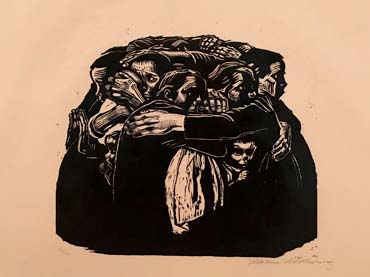
-
Until 4 September 2022 Retiro Park, Palacio de Cristal
Carlos Bunga
Against the Extravagance of Desire
Carlos Bunga (Porto, 1976) focused the beginning of his career on painting, before expanding his interests towards three-dimensional experimentations, allowing him to explore the interrelationships between bodies and spaces. A significant part of his work challenges the concept of architecture as a language of power, calling into question deep-seated inertia such as order, solidity and eternity. The graphic documentation of the process ends up the only “ruin”, the only reminder, of architecture that once existed. Modes of doing, and undoing, which underscore at once the constant mutability of the artistic process and the performative character of its social interaction.
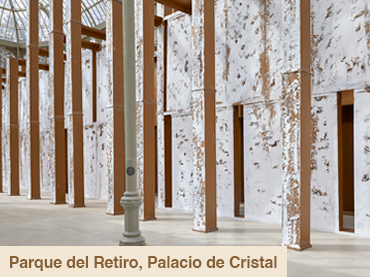
-
Until 5 September 2022 Sabatini Building, Floor 3, Vaults Room and Garden
< Garden of Mixtures: Attempts to Make Place, 1995 -… >
Alejandra Riera
TicketsAn exhibition devoted to the work of Alejandra Riera which assays the poetic modes of making place through a recurring image in her practice: a collective canvas, which for this occasion takes the form of a garden in movement. Beyond a retrospective, the exhibition seeks to experiment with the “how” of poetically renewing via a unique and shared experience, gestures and questionings which emerge from the archives of “lieuxdétudes” (places of studies) started by the artist almost three decades ago and unfurled here. The result of individual effort and long-term commitment, these Lieuxdétudes build and sustain affective and sensitive settings, spaces for interrogation and collective breathing.
Organised by: Museo Reina Sofía
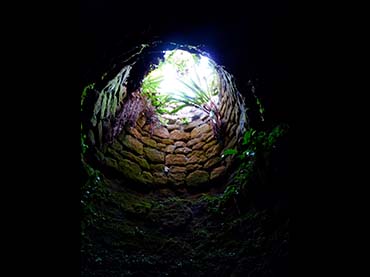
-
18 May - 10 October 2022 Sabatini Building, Floor 3
Graphic Turn
Like the Ivy on a Wall
TicketsGraphic Turn. Like the Ivy on a Wall is the outcome of a long collective research process conducted by the Southern Conceptualisms Network, in collaboration with the Museo Reina Sofía. The exhibition puts forward a survey of graphic art initiatives which have, from the 1960s to the present day, confronted urgent, politically oppressive contexts in Latin America, articulating strategies of transformation and resistance that radically changed art-making, the way in which it established intersubjective links, built communities, and even circulated graphic supports.
Curator: Southern Conceptualisms Network
Organised by: Museo Reina Sofía
With the support of: Embassy of the Argentine Republic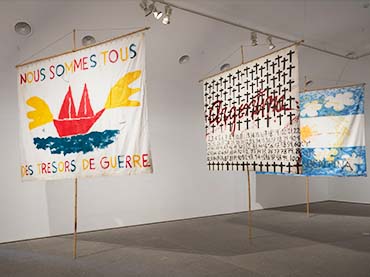
-
From Monday to Sunday (from 30 May 2022) Meeting Point: Sabatini Building, Floor 1, Education desk
Moving Guernica
Visit for Adults Around Works from the Collection
TicketsThe aim of this guided tour is for visitors to analyse the how and why of Guernica, by Pablo Picasso (Málaga, 1881–Mougins, 1973), becoming a symbol of the end of the Transition to democracy in Spain and a universally recognised icon. The mediators in these visits, each with their own personal approach, put forward new gazes at one of the most renowned artworks in the Museo Reina Sofía Collection.
Más actividades

Difficulty. Forms and Political Effects of Deviation in Writing and Contemporary Art
23 February – 14 December 2026 – Check programme
Difficulty. Forms and Political Effects of Deviation in Writing and Contemporary Art is a study group aligned towards thinking about how certain contemporary artistic and cultural practices resist the referentiality that dominates the logics of production and the consumption of present-day art. At the centre of this proposal are the concepts of difficulty and deviation, under which it brings together any procedure capable of preventing artistic forms from being absorbed by a meaning that appears previous to and independent from its expression. By ensuring the perceptibility of their languages, difficulty invites us to think of meaning as the effect of a signifying tension; that is, as a productive and creative activity which, from the materiality of art objects, frees aesthetic experience from the representational mandate and those who participate in it from the passiveness associated with tasks of mimesis and decoding.
The economy of the referential norm translates the social logic of capitalism, where insidious forms of capturing subjectivity and meaning operate. In the early 1980s, and adopting a Marxist framework, poet Ron Silliman highlighted how this logic entailed separating language from any mark, gesture, script, form or syntax that might link it to the conditions of its production, rendering it fetichised (as if without a subject) and alienating its users in a use for which they are not responsible. This double dispossession encodes the political strategy of referential objectivity: with no subject and no trace of its own consistency, language is merely an object, that reality in which it disappears.
The political uses of referentiality, more sophisticated today than ever before, sustain the neoliberal-extractivist phase of capitalism that crosses through present-day societies politically, economically and aesthetically. Against them, fugitive artistic practices emerge which, drawing from Black and Queer studies and other subaltern critical positions, reject the objective limits of what exists, invent forms to name what lies outside what has already been named, and return to subjects the capacity to participate in processes of emission and interpretation.
Read from the standpoint of artistic work, the objective capture of referentiality may be called transparency. Viewed from a social contract that reproduces inequality in fixed identity positions, transparent in this objectivity are, precisely, the discourses that maintain the status quo of domination. Opposite the inferno of these discourses, this group aims to collectively explore, through deviant or fugitive works, the paradise of language that Monique Wittig encountered in the estranged practices of literature. For the political potency of difficulty — that is, its contribution to the utopia of a free language among equals — depends on making visible, first, its own deviations; from there, the norm that those deviations transgress; and finally, the narrowness of a norm which in no way exhausts the possibilities ofsaying, signifying, referring and producing a world.
From this denouncement of referential alienation, fetishisation and capture, Difficulty. Forms and Political Effects of Deviation in Writing and Contemporary Art turns its attention to the strategies of resistance deployed by contemporary artists and poets. Its interest is directed towards proposals as evidently difficult or evasive as those of Gertrude Stein, Lyn Hejinian, Theresa Hak Kyung Cha, Kameelah Janan Rasheed, Kathy Acker, María Salgado and Ricardo Carreira, and as seemingly simple as those of Fernanda Laguna, Felix Gonzalez Torres and Cecilia Vicuña, among other examples that can be added according to the desires and dynamics of the group.
The ten study group sessions, held between February and December, combine theoretical seminars, work with artworks from the Museo Reina Sofía’s Collections and exhibitions, reading workshops and public programs. All these formats serve as spaces of encounter to think commonly about certain problems of poetics — that is, certain political questions — of contemporary writing and art.
Difficulty. Forms and Political Effects of Deviation in Writing and Contemporary Art inaugurates the research line Goodbye, Representation, through which the Museo Reina Sofía’s Studies Directorship seeks to explore the emergence of contemporary artistic and cultural practices which move away from representation as a dominant aesthetic-political strategy and redirect their attention toward artistic languages that question the tendency to point, name and fix, advocating instead for fugitive aesthetics. Over its three-year duration, this research line materializes in study groups, seminars, screenings and other forms of public programming.

CLINIC 2628. A Community of Writing and Research in the Arts
February – October 2026
Clinic 2628 is a project which supports and brings together writings which stem from the intention to offer a space and sustainable time for research work in art and culture. Framed within an academic context which is increasingly less receptive to the forms in which thinking happens and is expressed, the aim is to rescue the academic from its neoliberal trappings and thus recover the alliance between precision and intuition, work and desire. A further goal is to return writing to a commons which makes this possible through the monitoring of processes and the collectivisation of ideas, stances, references and strategies.
The endeavour, rooted in a collaboration between the Museo Reina Sofía’s Studies Directorship and the Artea research group, via the i+D Experimenta project, is shaped by three annual editions conceived as spaces of experimentation, discussion and a demonstration of writings critical of what is put forward by today’s academia.
What forces, forms and processes are at play when writing about art and aesthetics? In academia, in museums and in other cultural institutions, the practice of writing is traversed by productivist logics which jeopardise rhythms of research and experimentation. The imposition of both scientism inherent in the structure of “the paper” and the quantifying of results which demand a criterion of quality and visibility sterilise and smoothen, from the outset, the coarseness that is particular to writing understood from the concrete part of language: phonic, graphic, syntactic and grammatical resistance connecting the language user to the community the language unites and activates. They also sterilise the roughness enmeshed in the same desire to write, the intuitive, clear and confusing pathways that once again connect the writer to those reading and writing, participating in a common good that is at once discovered and produced.
The progressive commercialisation of knowledge propelled by cognitive capitalism moves further away from the research and production of knowledge in artworks and artistic languages and practices. The work of curators and archive, criticism, performances and essays formerly saw a horizon of formal and emotional possibilities, of imagination that was much broader when not developed in circumstances of competition, indexing and impact. Today, would it be possible to regain, critically not nostalgically, these ways; namely, recovering by forms, and by written forms, the proximity between art thinking and its objects? How to write in another way, to another rhythm, with no more demands than those with which an artwork moves towards different ways of seeing, reading and being in the world?

Cultural Work
Thursday, 12 February 2026 – 5:30pm
This series is organised by equipoMotor, a group of teenagers, young people and older people who have participated in the Museo Reina Sofía’s previous community education projects, and is structured around four themed blocks that pivot on the monstrous.
Session number two looks to approach film as a place from which cultural work is made visible and processes of production engage in dialogue with artistic creation. From this premise, the session focuses on exploring how audiovisual content is produced, assembled and distributed, from the hands that handle the images to the bodies that participate in its circulation. The aim is to reflect on the invisible effort, precarity and forms of collaboration that uphold cultural life, that transform the filmic experience into an act that recognises and cares for common work.

Alberto Greco. Viva el arte vivo
Tuesday, 10 February 2026 – 7pm
In conjunction with the opening of the exhibition Alberto Greco. Viva el arte vivo, Fernando Davis, the show’s curator, and Amanda de la Garza, the Museo Reina Sofía’s deputy artist director, will converse in the Nouvel Building’s Auditorium 400 on the life and work of the Argentinian artist, a core figure in experimental avant-garde art.
The title of both exhibition and conversation originates from the proclamation “Long Live Arte Vivo” Alberto Greco (Buenos Aires, 1931— Barcelona, 1965) disseminated around the streets and on the walls of Rome. For Greco, arte vivo was an art of the future, an art based on a set of irreverent and untimely gestures, of adventures open to unpredictability melding with life, and which began in 1962, prior to his coining of the term “vivo-dito”. In his Manifiesto dito dell´arte vivo (Dito Arte-Vivo Manifesto), which he pasted on the walls of Genoa, Greco encouraged new contact “with the living elements of our reality: movement, time, people, conversations, smells, rumours, places, situations”. He would also burst into the everyday of Madrid’s streets as he convened a “vivo-dito moment”, culminating in the burning of a canvas painted collectively in Madrid’s Lavapiés neighbourhood.
In addition to founding arte vivo, Alberto Greco was an informalist painter, a queer flâneur, a poet and sometime actor. This intense journey of Greco’s life and art is closely connected to the migrant route he embarked upon in 1950 in Buenos Aires, taking in Atacama and Humahuaca, Paris, Rio de Janeiro, São Paulo, Genoa, Rome, Madrid, Piedralaves, New York and Ibiza and ending abruptly in Barcelona, where he took his own life shortly after writing his final great work, the novel Besos brujos (Bewitching Kisses, 1965).
These inaugural conversations, part of the main working strands of the Museo’s Public Programmes Area, aim to explore in greater depth the exhibition narratives of the shows organised by the Museo from the perspective of artists, curators and specialists.
![Basel Abbas y Ruanne Abou-Rahme, At Those Terrifying Frontiers Where the Existence and Disappearance of People Fade Into Each Other [En esas fronteras aterradoras donde la existencia y la desaparición de personas se disuelven entre sí], 2019](https://recursos.museoreinasofia.es/styles/small_landscape/public/Colecci%C3%B3n/abbasabourahme.png.webp)
Gaza and Aestheticide
Tuesday February 10, 2026 – 16:00 h
“This seminar examines the systematic destruction of Palestinian collective sensibility — what we might call ‛aestheticide’ — that has accompanied Israel’s genocide and ecocide in Gaza, and considers the conditions of artistic practice in its aftermath. Over more than two years, the demolition of universities, archives, museums, and libraries has not only erased cultural and intellectual infrastructure but has also targeted the very possibility of representation itself. The destruction of a people has been accompanied by the destruction of their image, their history, and their capacity to be known: reportage, scholarship, and cultural memory have been deliberately undermined, with media institutions, universities, and museums often complicit in this repression. Gaza consequently functions as a rehearsal space for a possible global future — of fascism, post-liberal authoritarianism, militarized borders, and AI-enabled warfare —, a laboratory for an emerging world order. What, then, becomes of critical analysis and resistance under these conditions? And what becomes of aesthetics and politics?”
—T.J. DemosThis seminar takes place thanks to the art historian’s invitation to Spain by the Miró Foundation. In the context of the museum, it engages in dialogue with a broader line of work on the climate emergency and decolonial perspectives developed within the Museum of the Commons project (2023–2026) of the L’Internationale network, of which the Museo Reina Sofía is a member; as well as with some of the questions that animate the study group Aesthetics of Peace and Desertion Tactics. Finally, it is also embedded in a wider strategy of support for and commitment to the artistic and discursive practices of Palestinian artists and cultural practitioners, most clearly reflected in the TEJA network.